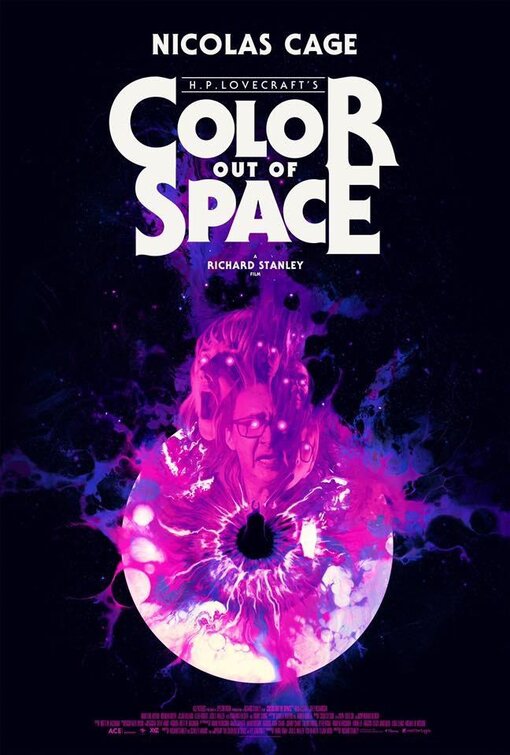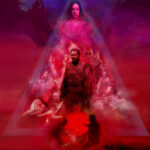It Will Consume You
Director
Richard Stanley
Starring
Nicolas Cage
Joely Richardson
Madeleine Arthur
Brendan Meyer
Julian Hilliard
Elliot Knight
Nathan Gardner [Cage] moves his family away from the city to his family home, deep in the woodland of Maine, following his wife Theresa’s [Richardson] mastectomy. Hoping this will help the family bond, he attempts to grow vegetables on the land and raise alpacas. This life doesn’t have the desired effect however as his two teenage children Lavinia [Arthur] and Benny [Meyer] resent being forced into the sticks and his wife feels detached from her high-pressure corporate job. The only one who seems to be at ease with the displacement is their youngest, Jack [Hilliard], but even he is quite withdrawn. Life for the Gardners shifts when a young hydrologist, Ward Phillips [Knight], is brought in to investigate a meteorite that crash-lands onto their farm and starts to display a clear and adverse effect on their mental stability.
To look at the technical aspects of this release is to understand why it ultimately doesn’t work. For every positive component there is a lacking one and the whole film suffers because of this general imbalance. From the very outset, Colin Stetson’s ethereal 80s synthy score is captivating, haunting and becomes progressively more manic and invasive in the best possible way, considering the nature of the premise. The visual elements are also quite interesting, from the effects which are often magical and otherworldly to the impressive practical effect work but unfortunately it never surpasses some of the maddening brilliance of The Thing and what we’re left with is a pale imitation. This also means we are offered several beautifully composed and constructed shots but not a great deal of cohesion between them and a great many ideas that never really go anywhere – but more on that later.
From a directorial and editorial standpoint, there is quite the heavy use of three way cross-dissolves (bleeding from one scene to another with a bridge shot that never fully materialises) but they regrettably fail to truly establish the displacement of time that they is intended. One could argue all of these pros and cons fall solely at the feet of director Richard Stanley. Stanley has been absent from the screen for over two decades and the details surrounding his firing from The Island Of Dr Moreau are fascinating but there’s something enjoyable about a director who was fired from a major project returning, not with a safe indie story but doubling down with a bat-shit crazy science fiction horror that will immediately ostracise a large portion of the audience for its weirdness. Knowing this, it almost explains how and why the film is the way it is, a stubborn, lovingly recreation of something that has never transitioned particularly well to cinema.
Aside from the atmospheric visual and aural aspects and with the narrative indifferent to the outside world, the majority of this movie is reliant on the Gardner family’s descent into madness; a task which the central cast rise to reasonably well. The chemistry between Richardson and Cage starts off well, with the family feeling like a plausible troupe. As the effects of the alien presence from the meteor become more felt, there are Close Encounters/Poltergeist levels of obsession and possession that add to the steady but slow march toward hysteria and moments of lucidity in between bouts of madness that help sell the decline. Given how a lot of people perceive Nicolas Cage, his subsidence into mania is a gradual one but the fact part of his transition relies on an impression of Nathan’s father (an individual, long dead, that we never see) often comes off cheesy and cartoony – which is so crushingly disappointing because there are so many fantastic instances of Cage staring off into the middle ground, like a worn out Kinski in Aguirre, breaking only to mutter some unsettling statement like “they’re not my family.” On top of this somewhat missed opportunity, each member of the ensemble cast have their own afflictions and symptoms but because we don’t get equal time with them, they feel lost or underdeveloped.
As much as there are parts of the casting that take a few missteps or come off as undercooked, the clear lack of a “sane” element, leaves the audience without a surrogate or anchor. The closest we have is Ward the hydrologist but his role is so minimalised that when he is eventually wheeled out, he acts completely irrationally, failing to establish he is distinctly different from the Gardners (albeit nowhere near as severe). This isn’t to say that a story about going insane can’t have an absence of logic, but not at the expense of the narrative or the characters themselves; there are plenty of examples where we follow individuals in this state but for every The Shining with its masterful performances, we have the completely baffling actions of the characters in something like Prometheus. But this is part of the trouble so many creatives have run into when adapting the works of HP Lovecraft, which heavily relies on the accounts of lone survivors and reminiscings/ramblings of strange events in journals or psychiatric doctor’s notes. Another similar disappointment was 2016’s The Void, which had a lot of decent visuals/effects amid the overall b-movie, schlocky aesthetic but it at least had a sense of prevailing urgency, which is somewhat lacking here. Speaking of which, the climax of the film rings little hollow but this is a unfortunate by-product of analysing an unknowable, malevolent colonising force from outer space (an intrinsic part of the horror) that can never offer any form of explanation to motivation. Again, something that should strengthen the sense of terror serves to simply undermine any form of structural closure, in a not too dissimilar way to Spielberg combining a cop-out closing with HG Wells’ clever conclusion in War Of The Worlds.
It also doesn’t help that the crux of the film is an unfathomable and inexplicable colour being shown in a visual medium like cinema, forcing them to resorting to a pink hue. It’s not a bad idea and it certainly looks eerie and atmospheric but when you have Cage saying, “there was a bright light, like a pink.. well actually it was like no colour I’ve ever seen before” the situation becomes laughable. There’s also a lot of markers and signposting set out in an organic opening that covers a lot of exposition neatly but most of it seemingly never goes anywhere. Things like Lavinia’s practicing of Wicca, the mayor wanting to buy the Gardner land and Nathan convinced he can get a profit from his alpacas; all of them effective dead ends. One of the most unusual is Theresa’s cancer. There is the assumption that the cancer would potentially link back to Richardson’s cosmic malady – most notably considering the visuals of her hair falling out, being unwillingly bonded with an organic form that is absorbing her and the helplessness of the family as they look on, not to mention the parallel with Stanley’s own mother suffering a similar fate – but no, it is apparently most inconsequential.
I feel that art shouldn’t necessarily be made to appease or assuage an audience (*cough* The Rise Of Skywalker *cough*), rather it should be created because it needs to experienced. For all the floundering and frustrations, I don’t actually dislike this film; I think it is grossly imperfect and wanting but ultimately Color Out Of Space feels different and for that it should be commended. I have heard that Stanley has plans to complete another two Lovecraftian releases, making this a thematic trilogy, and I would be sincerely curious to see what he does next.. providing he doesn’t return to exile for another twenty years or so.
Release Date:
28 February 2020
The Scene To Look Out For:
Toward the midpoint of the film, one of the first truly creepy moments takes place while Nathan is watching himself being interviewed on the news, loudly critiquing how it looks and that no one told him his hair looked so scruffy. All the while Theresa is in the kitchen, slowly entering a trance-like state, cutting a carrot dangerously close to her fingers. With the score, sound design and increasing rate of cuts, the whole thing becomes magnificently tense. Admittedly the conclusion plays off a little too jokey but that’s largely fine.
Notable Characters:
Two performances come to mind and they are both unfortunately neglected. The first is Hilliard as Jack Gardner, who holds his own extremely well – there’s one take that pushes in on him sat on the sofa as the family breaks down around him before he finally snaps out of it and seeks comfort from his mother. It’s the kind of impressive kid acting that horror often displays but is so often dismissed because the performance didn’t take place in a drama. The other performance is Tommy Chong as the local hermit Ezra. He too is given little to do but every time he is on screen he gives a captivating performance and his fate serves as the perfect embodiment of a Lovecraft victim.
Highlighted Quote:
“You might see her but I don’ think you’ll recognise her”
In A Few Words:
“While there are several positive elements at work, the final piece feels like an ultimately missed opportunity”
Total Score: 2/5
![The Red Right Hand Movie Reviews [Matthew Stogdon]](https://reviews.theredrighthand.co.uk/wp-content/uploads/2021/12/cropped-header1.png)




